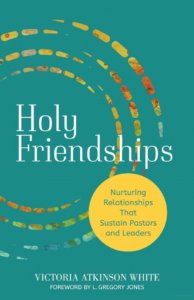Victoria Atkinson White says that pastors and Christian institutional leaders cannot do their holy work without the support of holy friendships. Mutual, sacred relationships deeply formed in God’s love combat loneliness and isolation, promote spiritual health and emotional wellbeing, and enable God’s servants to remain fruitful in ministry.
An institution cannot thrive if its leaders are not healthy, so my first question to harried pastors and Christian leaders trying to keep their churches and institutions afloat is always, how do you invest in your own sustainability? What are you doing to keep yourself healthy — physically, emotionally, spiritually, financially, socially, and intellectually?
At this point in the conversation, pastoral leaders look at me bewildered, because their recognition of their loneliness and lack of healthy social relationships confronts them in ways they cannot ignore. They realize they have fallen into patterns and practices of isolation that have become so familiar they feel like normal life. Tired and lonely, they’ve forgotten the hope and possibility that led them to this work in the first place.
“So, what are we supposed to do? What does investing in our sustainability look like?” they ask, hoping for an easy answer. And I always start my answer here: cultivating and nurturing holy friendships is critical to human flourishing. Pastors and Christian institutional leaders cannot do the holy work they are called to do without holy friendships.
What is a holy friendship?
Holy friendships are mutual sacred relationships deeply formed in God’s love. Mutuality comes from acknowledging the feeling of belonging that bonds holy friends together. They share a sense of reciprocity between them. Sacred refers to the “set apart-ness” of holy friendships because they are more intentional, more intimate, and different from ordinary friendships; they are holy, and they are regarded with or deserving deep respect, awe, reverence, or adoration. Because holy friendships are deeply formed in God’s love, we incarnate God’s love to one another. In loving our holy friends, we are loving God, loving ourselves, and loving our neighbors. Furthermore, holy friends participate in our lives in a triune way. They root us in God’s ongoing story by validating our past, holding space for us in the present, and helping us midwife a vision for the future. Holy friends push us to dream bigger, aim higher, and trust God more fully than we would on our own.
Holy friendships are mutual and sacred relationships deeply formed in God’s love. Holy friendships share all levels of friendship from casual chitchat (typically with deeper connections than in ordinary friendships) to ongoing discussions about a challenge one is working on to dark-night-of-the-soul conversations. A holy friendship consists of more than a pair of friends. God is at the center of it. Thus, it is set apart, privileged, and protected. A holy friendship is different from an ordinary friendship because it is held in God’s love and part of God’s bigger, ongoing story in the world. What sets them apart is that they have a larger purpose beyond the friendship itself: they help point both people toward God. Holy friends help us discover what 1 Timothy 6:19 called “the life that really is life.”
Holy friendships contribute to flourishing leaders.
I know holy friends are essential because this truth is evident in the lives of the hundreds of exemplary pastors and Christian leaders who shared with me their stories about these key relationships that make their healthy lives and healthy institutions possible. While research findings and anecdotal evidence give credence to this claim, perhaps the most compelling reason that I argue holy friends are necessary for sustainability and flourishing is that this truth has been borne out over and over in my own life.
The best, most transformative work is always done in collaboration because God made us for community. Life is so much fuller and more meaningful when we have at least one holy friend with whom we are honest, authentic, accountable, and in regular contact. Someone who gets who we are and why we are doing what we do is even better.
My experience teaching, talking with, and listening to Christian leaders for more than twenty years has taught me that holy friendship contribute to the flourishing of Christian leaders and thriving communities. When you are a healthy leader, you can lead others into health, and the ripple effects of that health continue ad infinitum. Holy friendships are among the most effective, stimulating, joyful, and worthwhile ways to experience this human journey and the challenge we’re given to lead God’s people.
 From: Holy Friendships: Nurturing Relationships That Sustain Pastors and Leaders by Victoria Atkinson White copyright © 2023 Fortress Press. Reproduced by permission. The book is available at Fortress Press, Cokesbury, and Amazon.
From: Holy Friendships: Nurturing Relationships That Sustain Pastors and Leaders by Victoria Atkinson White copyright © 2023 Fortress Press. Reproduced by permission. The book is available at Fortress Press, Cokesbury, and Amazon.
Related Resources
- Leaders Need Holy Friendships by Tom Berlin
- 4 Practices to Help Prevent Clergy Burnout by Matt Bloom and Kim Bloom
If you would like to share this article in your newsletter or other publication, please review our reprint guidelines.






